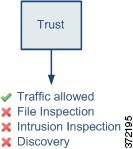The Trust action allows traffic to pass without deep inspection or network discovery. Trusted traffic is still subject to identity requirements and rate limiting.

Note |
-
Some protocols, such as FTP and SIP, use secondary channels, which the system opens through the process of inspection. In some cases, trusted traffic can bypass all inspection, and these secondary channels cannot be opened properly. If you run into this problem, change the trust rule to Allow.
-
For trust rules with logging options disabled, end-of-flow events are still generated in the system. However, the events are not visible on the event pages.
-
Because access control rules are evaluated after other policies, such as decryption, trusting a connection does not necessarily mean it will be fast-pathed with no inspection. For example, if a connection matches both a decryption rule that requires decryption, and a trust access control rule, the connection is decrypted and inspected as needed, prior to being allowed by the trust rule. Trust simply means no additional inspection, such as intrusion inspection, will be applied. If your intention is to allow a connection uninspected, either use the prefilter policy to fast path the connection, or ensure that no other policy applies inspection services to the connection.
|

